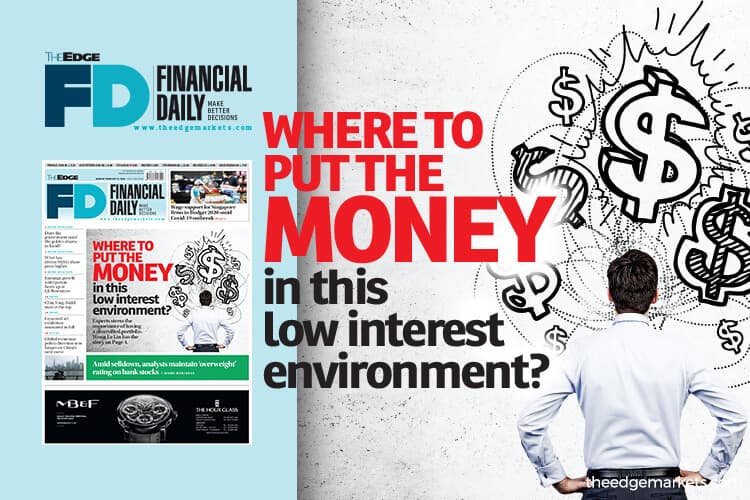
This article first appeared in The Edge Financial Daily on February 17, 2020
KUALA LUMPUR: As interest rates fall amid the slowdown in economic growth globally and in anticipation that economic woes will continue, an important question for many people is where to put their cash in the current environment.
While market experts say there will be a greater shift of interest towards the stock market in times of a low interest environment, the general advice is that investors should opt for a diversified portfolio.
Affin Hwang Asset Management Bhd senior portfolio manager Lim Chia Wei said a portfolio diversified into equities and bonds will still generate positive returns — although lower than the historical average — especially moving into a late-cycle environment.
“The reality is that the low interest rate environment has pushed up the valuation for almost every asset class, including equities and bonds,” said Lim, adding that the search for yields may lead investors to lean towards more income-based investments for stability and capital preservation.
While there are asset classes that come with higher yields or potential returns, higher risk profiles naturally come alongside, said Lim. “For instance, equities will still generate higher long-term returns as compared to bonds, but it will be more volatile with potentially higher drawdowns,” he added.
TA Investment Management Bhd chief investment officer Choo Swee Kee said savers should have a diversified portfolio encompassing emergency cash, fixed income or fixed deposits, property assets, equities and commodities (inclusive of gold) in that order.
In a nutshell, having a diversified portfolio would mean a more balanced risk and reward.
“The first objective of the portfolio should be on consistent income to meet minimum retirement needs. Once the minimum retirement needs are fulfilled, then only should the savers look at enhancing returns on extra funds by taking more risks in risk assets such as equities, commodities or forex (foreign exchange) trading,” Choo told The Edge Financial Daily.
He, however, pointed out that commodities other than precious metals such as gold are volatile and may not be suitable for savers.
“In the case of gold, it does not generate any yield but is an instrument to store value and as an inflation hedge,” he said, adding that savers should not dabble in currencies unless for holidays and children’s education or if they have plans to migrate.
Jerry Lee Chee Yeong, an assistant portfolio manager at online investment platform Fundsupermart, said it is always important for savers to have sufficient emergency funds that need to be liquid enough, before building their investment portfolios.
“Investors can look into money market funds whose interest will be given on a daily basis without being forced to lock in the money for a stipulated period. Short duration bond funds can be another option for investors to park their money as well,” Lee suggested.
For other instruments like commodity, currency and bitcoin, being an alternative investment, Lee opined that it should only be around 10% of investors’ total portfolio.
Equity market looking sexier
Some savers may move out from interest-bearing instruments like fixed deposits and bonds to alternative assets such as equities, commodities or derivatives that can generate higher returns albeit at a higher degree of risk, said TA’s Choo.
He added that very good yields ranging from 5% to 7% are found in regional property real estate investment trusts (REITs), given the current low interest rate environment.
A quick check on Bloomberg data shows that Sunway REIT has an indicated dividend yield of 5.16%, while IGB REIT and Pavilion REIT have yields of 4.4% and 4.56% respectively.
Fundsupermart’s Lee noted that a lower-interest rate environment is supportive of the equity market, making the valuation for equities look rather attractive, which in turn, draws more investors to start looking into the equity market that could yield higher returns.
“With the supportive monetary policy (low interest rate), the equity markets are likely to do better than the fixed-income assets,” said Lee, adding that it will usually benefit growth-oriented companies where the cost of funding is now relatively cheaper, thus helping to improve the companies’ bottom line.
At this juncture, he believes that several regional equity markets such as Asia ex-Japan, emerging markets and China equities are currently trading at attractive valuations with healthy earnings growth.
Affin Hwang’s Lim concurred, saying that low interest rates also help support economic growth that would buoy stock markets in general.
“However, there are a few countries that continue to see lacklustre stock market movement in spite of lower interest rates,” said Lim, explaining there are other factors that outweigh the benefits of interest rate cuts.